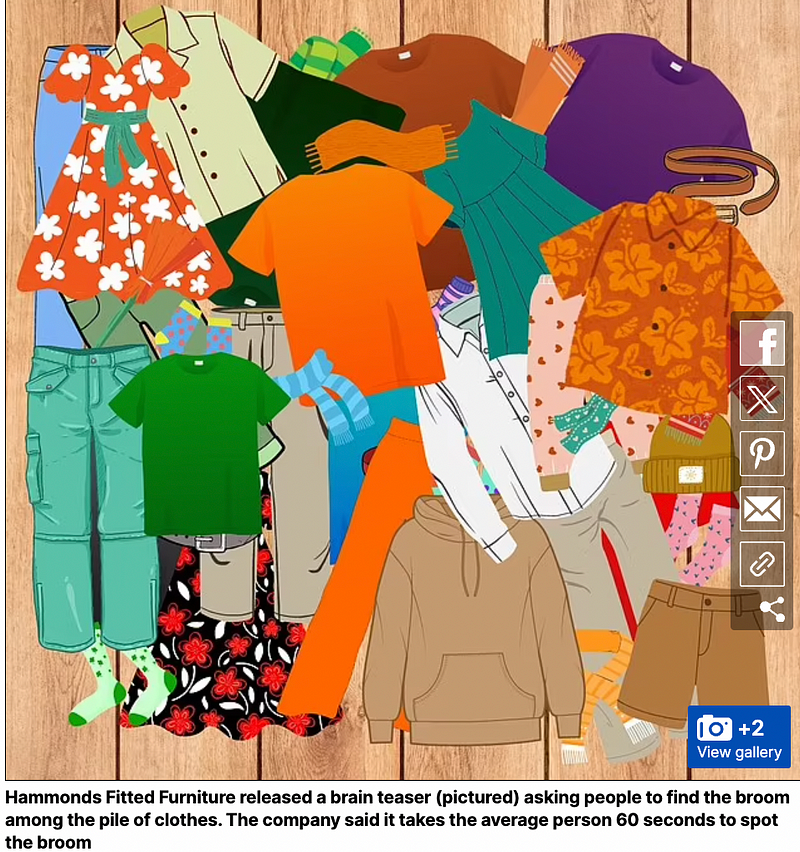Unlocking the Mind: Can You Solve This Unique Brain Teaser?
Written on
Chapter 1: The Challenge of Intelligence
Have you ever encountered a brain teaser that leaves you stumped for hours? Some individuals look at these puzzles and solve them instantly. Are you among the rare one-in-a-thousand geniuses? Let's find out.
It appears that intelligence varies dramatically among individuals, more than we often recognize. Growing up, we were categorized by letter grades—A, B, C, and F. (Curiously, where did the letter E go in this grading system?) Occasionally, people received a D, but in general, it seemed that each grade represented about a 25% increase in intelligence from the one below it. Thus, A students were thought to be approximately 25% smarter than those earning a B. However, neurologists have discovered that this assumption is fundamentally flawed.
Dr. David Divine, a neurologist, elaborates: “Those at the pinnacle of intelligence are nearly 100,000 times smarter than those at the bottom.” Remarkably, neurologists themselves are at the very top of this hierarchy, making them about a million times smarter than the average individual.
Despite their expertise, Dr. Divine admits a surprising truth: “We actually understand very little about the human brain.” This leads to a paradox where neurologists, while exceptionally intelligent, are also somewhat uninformed about their field compared to other scientific disciplines.
Other scientists, like physicists studying dark matter, face similar dilemmas. Dr. Divine compares them to enthusiasts studying mythical creatures: “These researchers are uncertain whether dark matter even exists. They are akin to Bigfoot hunters or fortune tellers interpreting bird movements. At least we know the brain is real, which gives us some advantage.”
What insights might the birds provide about your own intelligence? Dr. Divine offers an analogy: “Perhaps you function like a mainframe computer, possessing processing capabilities that could rival a billion billion gigawhats.”
“Gigawhats?” I question.
“Yes,” he responds, illustrating the rapid pace of his thoughts. “Most people, however, resemble an early Apple Macintosh—remember it? No hard drive, relying on floppy disks to boot up, making strange noises while starting up. Most people emit similar odd sounds when attempting to think, but we are often too oblivious to notice.”
Can one truly comprehend a frequency of sound before hearing it?
Divine continues, “Then there are those who resemble bricks rather than computers. So, we can categorize intelligence into three levels: supercomputer, 1983 Macintosh, or brick.”
“I think I might be a brick,” I reply.
“Probably,” he concedes a bit too quickly. “But the only way to determine your intelligence is through the brain teaser test.”
Why is this test such an effective measure of intelligence?
“I can’t quite recall why,” he admits, “but it originates from the very top. You can trust me on that.”
The top?
“Yes, indeed. Check it out for yourself.”
I glance at the image accompanying the brain teaser, which reads: Hammonds Fitted Furniture.
“Hammonds Fitted Furniture?” I exclaim. “That’s the pinnacle?”
“The very pinnacle,” he asserts. “They make the most significant decisions in neurology.”
“And in furniture too, one might assume,” I retort.
“Your sarcasm only goes so far, Ms. Stevens,” he replies, his tone growing stern. “I assure you, fitted furniture represents the ultimate achievement in furniture design.”
“What exactly is fitted furniture?”
He pauses, seemingly at a loss. “Let’s Google it.”
He pulls out his phone, reading aloud: “Fitted furniture refers to custom-built pieces that are affixed to the walls or floors of a room.”
“So these are the experts behind the brain teaser?” I ask. “Is this some promotional tactic for their company?”
“I’m not certain,” Divine responds. “Perhaps they’re gearing up for a big summer sale. Must you dissect everything, Ms. Stevens? Can’t you accept that Hammonds Fitted Furniture knows what they’re doing? They manage to secure couches in place in your home. Can you do that?”
“Probably,” I say. “If I had a hammer, I’d give you a gentle tap right now.”
“That’s enough!” he snaps, clearly irked.
“Do you wish to order some fitted furniture or not?” he demands.
“No! I prefer to rearrange my furniture based on my mood. One day my couch is here; the next, it’s outside.”
“Fitted furniture could stabilize your moods,” he suggests, desperation creeping into his voice.
“Alright,” I relent, “I’ll order some fitted furniture. Have you ever bought something just because the salesperson seemed so eager? I find myself doing that regularly.”
Now I have all this furniture permanently affixed throughout my house, driving me to distraction.
On a brighter note, I managed to locate the broom in the image published by Hammonds Fitted Furniture and the Neurology Company. So, am I a super genius, a mainframe computer, or just a gullible fool? Can you find it? Probably not. I only have about a thousand regular readers, so I'd likely need a larger audience to get more than one response on this genius test. But go ahead, give it a try. (I know I supposedly have 26,000 followers; I worry about the missing 25,000. It feels like there may have been a mass extinction event I missed.)
Let me know how you fare. I’ll be in the showroom. (Full disclosure: I now work for Hammonds Fitted Furniture, and Divine and I are somewhat dating. I remain uncertain about him. He's a bit slippery, and I wouldn't be shocked if he has another family elsewhere.)
“How did you discover that?”
Oh, David Divine! You amuse me. I adore you, even if you aren’t a genuine neurologist.
“Who is a genuine neurologist?” he quips. “It may take another hundred years before we encounter one. The brain continues to perplex even the brightest among us.”
So, take the test. Discover if you are a supercomputer, an Apple Macintosh, or a brick. Share your results in the comments!
